

Reshaping the Idea of the Cyborg - MindMedley. 8 Possible Alternatives To The Turing Test. Evolution Continues.
Machine Ethics. The Frame Problem. 1.
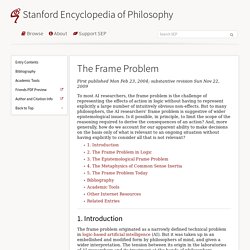
Introduction The frame problem originated as a narrowly defined technical problem in logic-based artificial intelligence (AI). But it was taken up in an embellished and modified form by philosophers of mind, and given a wider interpretation. The tension between its origin in the laboratories of AI researchers and its treatment at the hands of philosophers engendered an interesting and sometimes heated debate in the 1980s and 1990s. But since the narrow, technical problem is largely solved, recent discussion has tended to focus less on matters of interpretation and more on the implications of the wider frame problem for cognitive science. 2. Put succinctly, the frame problem in its narrow, technical form is this (McCarthy & Hayes 1969).
Colour(x, c) holds after Paint(x, c) Position(x, p) holds after Move(x, p) Now, suppose we have an initial situation in which Colour(A, Red) and Position(A, House) hold. The main obstacle to doing this is the monotonicity of classical logic. 3. Heideg: 459. Turing farm. Let's think about Cyberpunk future of roachblood humans.
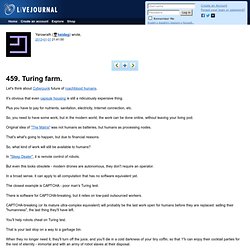
It's obvious that even capsule housing is still a ridiculously expensive thing. Plus you have to pay for nutrients, sanitation, electricity, Internet connection, etc. So, you need to have some work, but in the modern world, the work can be done online, without leaving your living pod. Original idea of "The Matrix" was not humans as batteries, but humans as processing nodes. That's what's going to happen, but due to financial reasons. So, what kind of work will still be available to humans? In "Sleep Dealer", it is remote control of robots. But even this looks obsolete - modern drones are autonomous, they don't require an operator. In a broad sense, it can apply to all computation that has no software equivalent yet. The closest example is CAPTCHA - poor man's Turing test.
Leading AI Experts Are Gathering To Improve The Turing Test. Humans, Version 3.0. Credit: Flickr user Suvcon Where are we humans going, as a species?
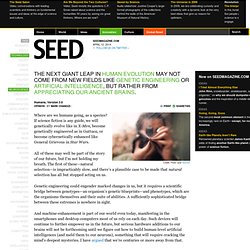
If science fiction is any guide, we will genetically evolve like in X-Men, become genetically engineered as in Gattaca, or become cybernetically enhanced like General Grievous in Star Wars. All of these may well be part of the story of our future, but I’m not holding my breath. The first of these—natural selection—is impracticably slow, and there’s a plausible case to be made that natural selection has all but stopped acting on us. Genetic engineering could engender marked changes in us, but it requires a scientific bridge between genotypes—an organism’s genetic blueprints—and phenotypes, which are the organisms themselves and their suite of abilities. And machine-enhancement is part of our world even today, manifesting in the smartphones and desktop computers most of us rely on each day.
Simply put, none of these scenarios are plausible for the immediate future. But how do I know this is feasible? And culture’s trick? Welcome to Life: the singularity, ruined by lawyers. From Philosophy to Math to Engineering. How Much Longer Before Our First AI Catastrophe? As I distinctly recall, some speculated that the Stock Market crash of 1987, was due to high frequency trading by computers, and mindful of this possibility, I think regulators passed laws to prevent computers from trading in that specific pattern again.
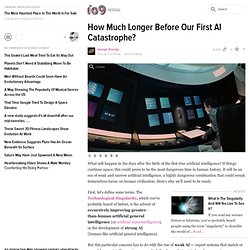
I remember something vague about about "throttles" being installed in the trading software that kick in whenever they see a sudden, global spike in the area in which they are trading. These throttles where supposed to slow down trading to a point where human operators could see what was happening and judge whether there was an unintentional feedback loop happening. This was 1987. I don't know if regulators have mandated other changes to computer trading software in the various panics and spikes since then. But yes, I definitely agree this is very good example where narrow AI got us into trouble. These are all examples of narrow machine intelligence.
Obviously no system is going to be perfect. So it goes. Confessions of a Biological Scientist – Part I: The Limits of Meat. Science has proceeded uninterrupted for hundreds of years now, through its progress we have emerged from ignorance and awakened to the reality of our Universe.
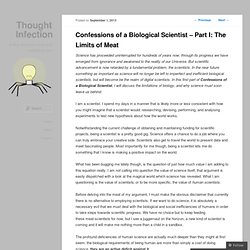
But scientific advancement is now retarded by a fundamental problem, the scientists. In the near future something as important as science will no longer be left to imperfect and inefficient biological scientists, but will become be the realm of digital scientists. Why The Scariest Sci-Fi Robot Uprising Has Already Begun. How consciousness works – Michael Graziano. Scientific talks can get a little dry, so I try to mix it up.
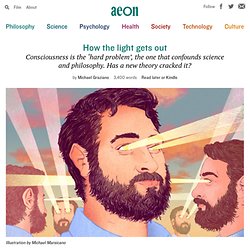
I take out my giant hairy orangutan puppet, do some ventriloquism and quickly become entangled in an argument. I’ll be explaining my theory about how the brain — a biological machine — generates consciousness.